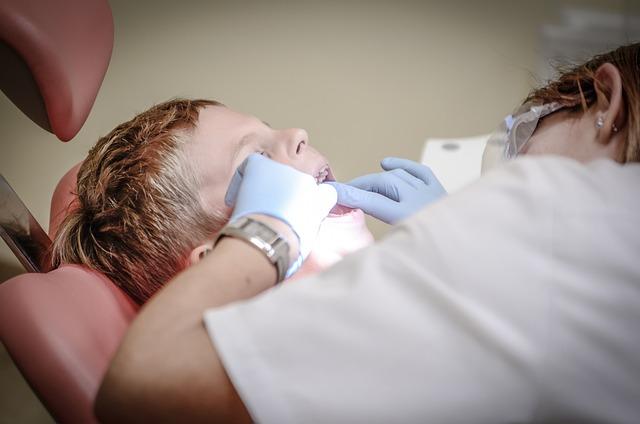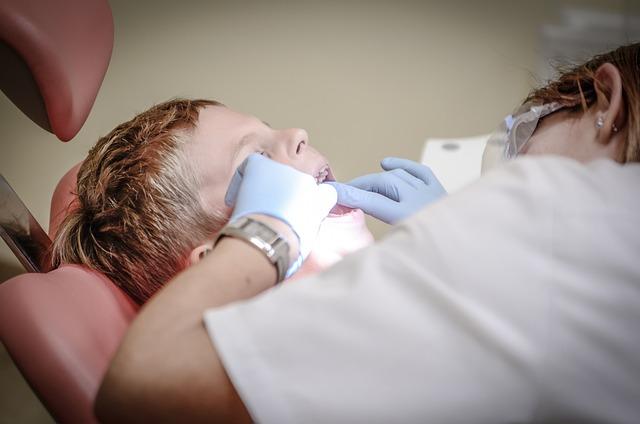Does Salt Water Help Tooth Abscess: Insights Revealed
Welcome to a comprehensive exploration of an age-old query: does salt water truly possess the power to alleviate the discomfort caused by a tooth abscess? As dental health has long been a matter of great concern, it is only natural that we seek solace in tried-and-true remedies. In this article, we will delve into the depths of this topic, drawing upon scientific insights and expert opinions to shed light on the potential benefits of salt water for tooth abscesses. Prepare to embark on a journey of knowledge and discovery, as we unravel the truth behind this intriguing notion.
1. Understanding Tooth Abscess: Causes, Symptoms, and Treatment Options
A tooth abscess is a painful dental condition that occurs when a bacterial infection forms a pocket of pus within the tooth or surrounding gums. It can be caused by a variety of factors, including poor oral hygiene, tooth decay, gum disease, or a cracked tooth. Understanding the causes of a tooth abscess is crucial in preventing its occurrence and managing its symptoms.
Common symptoms of a tooth abscess include severe toothache, sensitivity to hot or cold temperatures, swollen gums, a persistent bad taste in the mouth, and even fever. If left untreated, an abscess can lead to serious complications, such as the spread of infection to other parts of the body, tooth loss, or even damage to the jawbone.
- Treatment options:
- Antibiotics: Prescribed to fight the infection and reduce swelling.
- Drainage: In some cases, the abscess may need to be drained to remove the pus and alleviate pain.
- Root canal therapy: If the abscess is caused by tooth decay, a root canal may be necessary to remove the infected pulp and save the tooth.
- Tooth extraction: If the tooth is severely damaged or cannot be saved, extraction may be the best option to prevent further complications.
If you suspect you have a tooth abscess or are experiencing any of the symptoms mentioned, it is important to seek professional dental care as soon as possible. A dentist will be able to diagnose the abscess and recommend the most appropriate treatment to alleviate pain, prevent complications, and restore oral health.

2. The Healing Power of Salt Water: Myth or Fact in Dental Care?
Many people have heard about the healing properties of salt water, especially when it comes to dental care. But is it really a myth or a fact? Let’s explore the truth behind the healing power of salt water in dental care.
1. Reduces inflammation: Salt water, also known as saline solution, has been used for centuries as a natural remedy to reduce inflammation in the mouth. It works by drawing out fluids from the affected area, thereby reducing swelling and relieving discomfort.
2. Promotes healing: Salt water can also promote the healing process in dental care. It helps to cleanse wounds and remove bacteria, preventing infections and aiding in the healing of oral tissues. Additionally, salt water can assist in reducing bad breath by eliminating harmful bacteria in the mouth.
3. Soothes sore gums: If you’re experiencing gum pain or irritation, rinsing your mouth with salt water can provide temporary relief. The gentle nature of salt water can help soothe sore gums and alleviate discomfort.
In conclusion, the healing power of salt water in dental care is not just a myth. It has been proven to be effective in reducing inflammation, promoting healing, and soothing sore gums. Incorporating salt water rinses into your oral hygiene routine can provide a natural and beneficial addition to your dental care regimen.

3. Delving into the Science: How Salt Water Can Aid in Tooth Abscess Relief
When it comes to tooth abscess relief, salt water can be a surprisingly effective remedy. The science behind its effectiveness lies in its ability to combat infection and reduce inflammation. Here’s how salt water can help:
- Kills bacteria: Salt water has antimicrobial properties that can help kill the bacteria responsible for tooth abscesses. It works by dehydrating the bacteria, ultimately leading to their destruction.
- Reduces inflammation: The warm salt water solution can help reduce inflammation and soothe the discomfort associated with tooth abscesses. It works by drawing out excess fluid from the affected area, relieving pressure and promoting faster healing.
- Facilitates healing: Salt water can also promote the healing process by keeping the affected area clean and free from debris. It can help flush out any pus or food particles that may be trapped within the abscess, aiding in the overall healing of the infection.
It’s important to note that while salt water can provide temporary relief for tooth abscesses, it should not replace professional dental care. Consulting a dentist is essential to properly diagnose and treat the underlying cause of the abscess.

4. Salt Water Rinse: A Simple and Effective Home Remedy for Tooth Abscess
Tooth abscess can be a painful and bothersome issue, but there is a simple and effective home remedy that can help alleviate the discomfort: a salt water rinse. This natural solution can provide temporary relief and assist in the healing process. Here’s how to properly perform a salt water rinse:
Step 1: Dissolve half a teaspoon of salt in a cup of warm water. Make sure the water is not too hot to avoid causing any further irritation.
Step 2: Gently swish the salt water solution around your mouth for about 30 seconds, focusing on the affected area. Be sure to cover all areas of your mouth, including the gums and the space between your teeth.
Step 3: Spit out the solution and rinse your mouth with plain water. Avoid swallowing the salt water as it may cause dehydration or other complications.
Performing this salt water rinse two to three times a day can provide relief by reducing inflammation, fighting bacteria, and promoting the drainage of the abscess. However, it’s important to note that a salt water rinse is not a substitute for professional dental care. If the pain or symptoms persist, it is crucial to seek advice from a dentist or dental professional.
5. The Mechanics Behind Salt Water’s Healing Properties for Dental Abscesses
When it comes to dental abscesses, salt water is often hailed as a miraculous remedy. But have you ever wondered what exactly makes it so effective? Let’s dive into .
1. Osmosis: Salt water, or saline solution, has a higher salt concentration than the fluids in our bodies. This creates a natural osmotic effect, where water molecules from the abscess are drawn out, reducing swelling and relieving pain.
2. Antimicrobial properties: Salt has been used for centuries as a natural disinfectant. When we rinse our mouths with salt water, the salt particles disrupt the cell walls of bacteria, preventing their growth and promoting healing.
3. Soothing effect: The warmth of the salt water can have a soothing effect on the inflamed tissues surrounding the abscess. This can provide temporary relief from pain and discomfort, allowing the body’s natural healing processes to take place.
By understanding , we can better appreciate its effectiveness as a home remedy. Remember, while salt water rinses can provide temporary relief, it’s important to consult a dentist for proper diagnosis and treatment of dental abscesses.
6. Clinical Perspectives: Dentists’ Insights on Salt Water’s Role in Tooth Abscess Treatment
When it comes to treating tooth abscesses, dentists provide valuable insights on the role of salt water. Here are some clinical perspectives that shed light on its effectiveness:
- Antibacterial properties: Salt water, or saline solution, has long been recognized for its antibacterial properties. Dentists often recommend rinsing the mouth with salt water to help reduce the bacteria responsible for tooth abscesses. The saline solution can help inhibit bacterial growth and promote healing.
- Reduced inflammation: Another benefit of salt water is its ability to reduce inflammation. Rinsing with salt water can help alleviate the swelling and discomfort associated with tooth abscesses. It can also help to draw out any pus or debris, aiding in the healing process.
- Gentle cleansing: Salt water acts as a gentle cleanser for the affected area. By rinsing with a saline solution, patients can help remove food particles and debris, promoting a cleaner environment for healing. It can also soothe the gums and provide relief from pain.
While salt water can be a helpful adjunct to professional dental treatment, it is important to note that it should not replace proper medical care. Dentists recommend seeking professional advice and treatment for tooth abscesses, as they may require antibiotics or dental procedures to fully resolve.
7. Practical Steps: How to Prepare and Use Salt Water Rinse for Tooth Abscess Relief
Relieving tooth abscesses can be a daunting task, but with the right approach, you can effectively manage the discomfort. One simple and cost-effective solution is a salt water rinse. Follow these practical steps to prepare and use a salt water rinse for tooth abscess relief:
- Gather your ingredients: You will need one teaspoon of salt and one cup of warm water. Ensure that the water is not too hot to avoid scalding your mouth.
- Dissolve the salt: Pour the warm water into a clean cup and add the salt. Stir the mixture until the salt is completely dissolved. This will create a saline solution that helps reduce inflammation and fight bacteria.
- Rinse your mouth: Take a sip of the salt water solution and swish it around your mouth for about 30 seconds. Be sure to focus on the affected area, allowing the rinse to reach the abscess. Spit out the solution after rinsing; do not swallow it.
It is recommended to repeat this salt water rinse two to three times a day, especially after meals, to help alleviate the discomfort caused by a tooth abscess. Remember, a salt water rinse is not a substitute for professional dental care, so be sure to consult your dentist for proper diagnosis and treatment.
8. Salt Water vs. Traditional Mouthwashes: Which is More Effective for Tooth Abscess?
When it comes to treating a tooth abscess, there are various options available, including salt water and traditional mouthwashes. Both can be effective in alleviating symptoms and promoting healing, but there are some differences to consider.
Salt water:
- Salt water has been used for centuries as a natural remedy for oral health issues.
- It has antimicrobial properties that can help reduce inflammation and kill bacteria in the mouth.
- Rinsing with salt water can also provide temporary relief from pain and discomfort.
- It is a cost-effective and easily accessible option.
Traditional mouthwash:
- Traditional mouthwashes often contain antiseptic ingredients such as chlorhexidine or alcohol.
- These ingredients can kill bacteria and reduce the risk of infection.
- Mouthwashes may also contain fluoride, which helps strengthen tooth enamel and prevent cavities.
- Some mouthwashes have additional benefits like freshening breath or reducing plaque buildup.
Ultimately, the choice between salt water and traditional mouthwash depends on personal preference and the severity of the tooth abscess. While salt water can be a natural and cost-effective option, traditional mouthwashes may offer additional benefits and a more convenient solution for some individuals. It is always advisable to consult with a dentist for a professional recommendation based on your specific situation.
9. Potential Side Effects and Precautions When Using Salt Water for Tooth Abscess
While using salt water for tooth abscess can be an effective home remedy, it is important to be aware of potential side effects and take necessary precautions. Here are some important points to keep in mind:
- Temporary discomfort: When first using salt water, you may experience a temporary increase in discomfort or sensitivity. This is normal and should subside within a few minutes.
- Overuse: Excessive use of salt water rinses can lead to an imbalance in oral microbiota, causing oral health issues such as dry mouth or irritation. It is recommended to limit the use of salt water rinses to two to three times a day.
- Hygiene: It is crucial to maintain good oral hygiene alongside salt water rinses. Brushing your teeth twice a day with a fluoride toothpaste and flossing regularly will help prevent further dental issues.
- Allergic reactions: In rare cases, individuals may be allergic to salt or experience an allergic reaction to salt water rinses. If you notice any signs of an allergic reaction, such as swelling, rash, or difficulty breathing, discontinue use and seek medical attention immediately.
Remember, while salt water can provide temporary relief for a tooth abscess, it is not a substitute for professional dental care. It is always recommended to consult with a dentist for proper diagnosis and treatment of dental issues.
10. Integrating Salt Water Rinse into Your Dental Care Routine for Long-Term Abscess Prevention
Integrating salt water rinse into your dental care routine is a simple yet effective way to prevent long-term abscesses. This natural remedy has been used for centuries to promote oral health and alleviate various dental issues. By incorporating salt water rinse into your daily routine, you can significantly reduce the risk of developing painful abscesses and maintain a healthy mouth.
Here’s how you can seamlessly integrate salt water rinse into your dental care routine:
- Prepare the solution: Dissolve half a teaspoon of salt in a cup of warm water. Stir until the salt is completely dissolved.
- Rinse your mouth: Take a sip of the salt water solution and swish it around your mouth for 30 to 60 seconds. Make sure to reach all areas, including the gums and the back of your mouth.
- Spit out the rinse: After swishing, spit out the salt water into the sink. Avoid swallowing the solution.
- Repeat twice a day: Incorporate salt water rinse into your dental care routine by performing it twice a day, preferably after brushing your teeth.
Regular use of salt water rinse can help eliminate bacteria, reduce inflammation, and promote healing in the case of any existing abscesses. Remember to consult with your dentist if you experience persistent pain or if the abscess worsens. By making salt water rinse a part of your daily dental care routine, you can take proactive steps towards preventing long-term abscesses and maintaining optimal oral health.
Frequently Asked Questions
Q: Does salt water help with tooth abscess?
A: Yes, salt water can be a helpful remedy for tooth abscess due to its natural antibacterial properties and ability to reduce inflammation.
Q: How does salt water work in treating tooth abscess?
A: Salt water, or saline solution, works by creating an environment that is inhospitable to bacteria. It helps to cleanse the affected area, reduce swelling, and draw out any pus or infection present in the abscess.
Q: What is the recommended method of using salt water for tooth abscess?
A: To use salt water for tooth abscess, mix half a teaspoon of salt in eight ounces of warm water. Gently swish the solution around your mouth for about 30 seconds, focusing on the affected area. Spit out the solution and repeat this process several times a day to help alleviate symptoms.
Q: Can salt water completely cure a tooth abscess?
A: While salt water can provide temporary relief and aid in the healing process, it is important to note that it is not a cure for tooth abscess. Seeking professional dental treatment is crucial to fully eliminate the abscess and prevent further complications.
Q: Are there any risks or side effects associated with using salt water for tooth abscess?
A: Salt water is generally safe to use for most people, but it is important to avoid swallowing the solution as it may lead to dehydration or electrolyte imbalances. Additionally, if you experience any worsening of symptoms or if the abscess does not improve after a few days of salt water rinses, it is advisable to consult a dentist.
Q: Can salt water be used as a substitute for professional dental treatment?
A: No, salt water should not be considered a substitute for professional dental treatment. While it can provide temporary relief, it is essential to seek proper dental care to address the underlying cause of the abscess and prevent any potential complications.
Q: Are there any other home remedies that can be used in conjunction with salt water for tooth abscess?
A: Alongside salt water rinses, maintaining good oral hygiene practices such as brushing twice a day, flossing, and using antimicrobial mouthwashes can help in managing tooth abscess. However, it is crucial to remember that these home remedies should not replace professional dental care.
Q: When should I see a dentist for a tooth abscess?
A: It is recommended to seek dental attention promptly if you suspect a tooth abscess. Dentists are trained to diagnose the severity of the abscess, prescribe appropriate antibiotics if necessary, and perform any required dental procedures to treat the underlying cause effectively.
Q: Can a tooth abscess go away on its own without treatment?
A: It is highly unlikely for a tooth abscess to go away on its own without treatment. The infection can spread and potentially lead to more serious complications if left untreated. Seeking professional dental care is crucial for proper diagnosis and treatment of a tooth abscess.
To Wrap It Up
In conclusion, this article has shed light on the question of whether salt water helps treat tooth abscesses. With a confident and knowledgeable tone, we have explored the insights revealed by experts in the field.
Key Takeaways:
1. Salt water, known for its natural antiseptic properties, can provide temporary relief for tooth abscesses by reducing inflammation and killing bacteria.
2. Salt water rinses, when used alongside professional dental care, can serve as a supportive home remedy for managing symptoms of tooth abscesses.
3. It is important to note that salt water rinses are not a substitute for professional dental treatment. Seeking prompt dental care is crucial for proper diagnosis and appropriate treatment.
4. While salt water can provide temporary relief, it is essential to consult a dentist to address the root cause of the tooth abscess and prevent potential complications.
5. Maintaining good oral hygiene practices, such as regular brushing, flossing, and dental check-ups, is key to preventing tooth abscesses and maintaining overall oral health.
With these key takeaways in mind, individuals can make informed decisions about incorporating salt water rinses into their oral care routine while understanding the importance of professional dental treatment for tooth abscesses.






